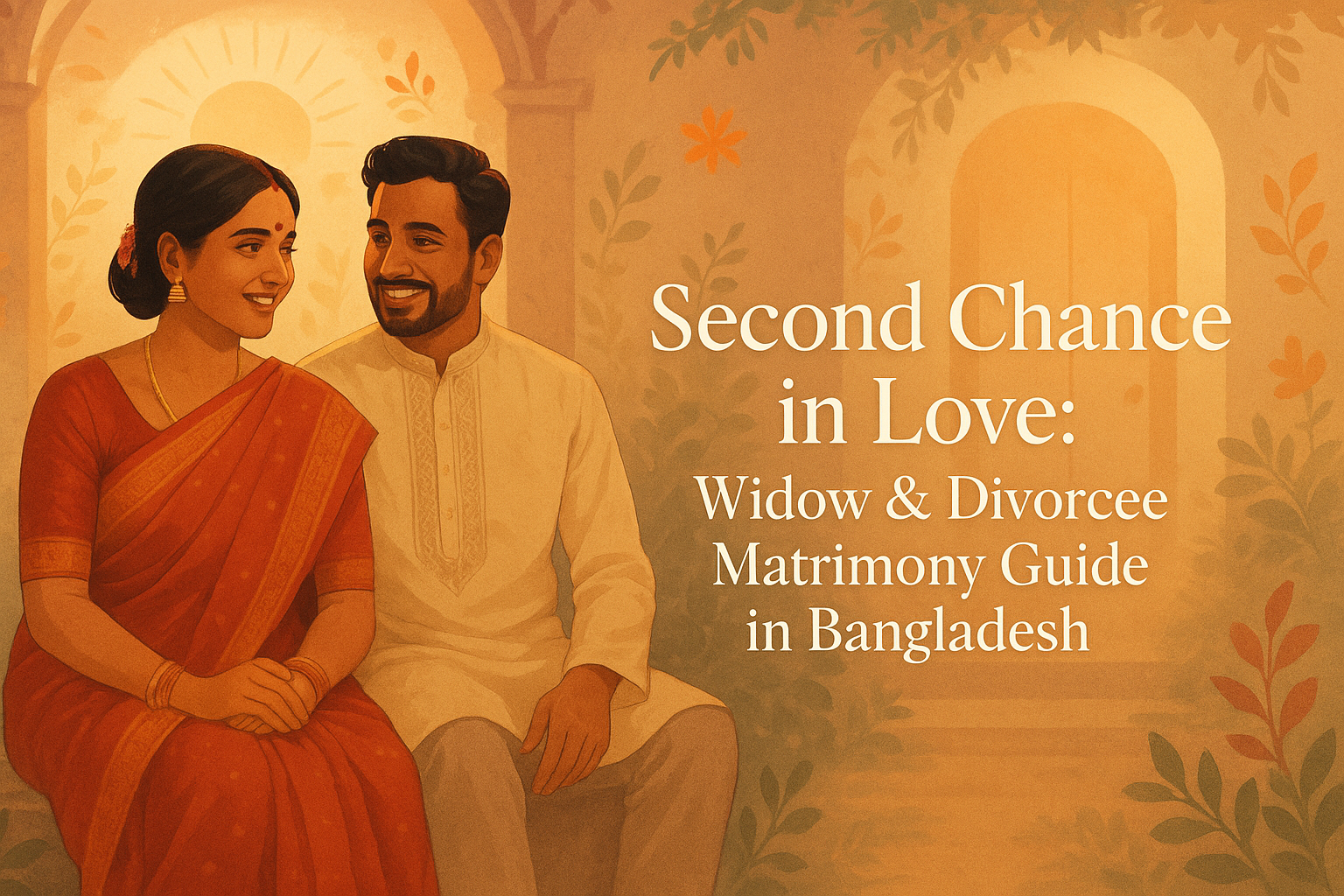
Second Chance in Love: Widow & Divorcee Matrimony Guide in Bangladesh
Introduction
If love had auditions, a second marriage would be its encore
performance—wiser, more deliberate, and maybe with fewer butterflies. For
widows and divorcees in Bangladesh, starting again can feel like stepping onto
a stage full of social expectations—some supportive, many whispering doubts.
But societal shifts, role of soulmate-searching platforms, and personal courage
are reshaping the narrative. This blog, espousing subtle humour and compassion,
is your roadmap to embracing that second chance with heart and dignity.
Why Second Chances Matter in Bangladeshi Matrimony
Remarriage isn't just about companionship—it's about
reclaiming self-worth and defying stigma. Though remarriage rates in Bangladesh
remain low overall, middle-class and urban families are increasingly open to
second unions. Islamic and legal traditions permit and support remarriage,
making it a viable and legitimate option for widows and divorcees. And with
divorce rising, the “second marriage” trend is quietly becoming more
common—about three times higher today than in the 1970s, according to media
reports.
Challenges Widows & Divorcees Face in Finding a Match
Navigating matrimony as a widow or divorcee in Bangladesh
can feel like threading a needle in a hailstorm:
- Cultural
taboos and conservative mindsets place undue judgment, especially on
women who divorce or remarry. Shame and rumours can linger longer than
grief or healing.
- Age
and children: Older widows or single mothers often encounter fewer
proposals, while men with children are more socially accepted partners.
- Family
pressure: Siblings or elders might express concern or even shame about
remarriage.
The Rise of Widow & Divorcee Matrimony Platforms in Bangladesh
Enter digital matchmakers: niche sites now cater to widow
and divorcee needs. Platforms like MarriageChime.com, Nikah.com, DivorceeMatrimony.com,
and WowMatrimony offer dedicated sections for remarriage in Bangladesh. Large
general portals like BharatMatrimony, BangladeshiMatrimony.com,
and Bibahabd.com also include filters for widowed or divorced profiles. These
platforms allow you to filter by religion, age, children, and education.
How to Approach Second Marriage with Confidence
- Emotional
readiness
Be honest with yourself about grief, guilt, or expectations. Healing comes first, even if the waiting period ends up being shorter than expected. - Communication
tips
Keep open dialogue with prospects. Talk about children, lifestyle preferences, and expectations early—they sometimes matter more in second unions. - The
art of writing your bio
Use keywords like widow/divorcee looking for second marriage Bangladesh, remarriage Bangladesh, or divorcee matrimony BD partner subtly in your profile. Be honest about your past—state age, religion, profession, personal values—and keep it positive, respectful, intriguing. A little wit—“ready for love’s second innings” or “allergic to drama, not romance”—can make your bio memorable.
Legal and Religious Considerations in Second Marriages
In Islam, widow and divorcee remarriage is entirely
permissible—no waiting if you're a widow; if divorced, the idda period
must first end. Registration through the Kazi office or local Union
Parishad is important. Financial arrangements, custody rights, and any
previous settlements should be clarified before saying “yes.” Knowing your
rights under Bangladeshi civil law ensures peace of mind. Legal advice or
consultation is wise for clarity and transparency.
Talking to Your Family About a Second Marriage
Bringing family along on the journey can soften resistance:
- Start
with empathy: acknowledge their concerns for reputation and children.
- Introduce
humour to ease tension: “I promise this time I’ll pick someone with a
better cooking palate than me.”
- Highlight
benefits: extra support for children, shared household duties,
companionship, financial stability.
- Be
patient—acceptance may take time and gentle conversations.
Success Stories: Real‑Life Second Marriage Experiences
Here are two snippets from people in Bangladeshi
society:
- Ayesha,
34, Dhaka: A mother of one, widowed at 29. She joined a matrimony site
and filtered for single fathers. She connected with a thoughtful teacher
from Sylhet. Skipped the small talk, bonded over kids and parenting goals.
Now happily married. “I thought I’d lost love forever—turns out, it was
just on pause.”
- Rafiq,
45, Chittagong: Divorcee with two teens. Met a confident career woman
via a special divorcee matrimony portal. They negotiated custody
arrangements upfront. Married six months later. “Divorce felt like the
end—this feels like a do-over on better script.”
These stories reinforce: there’s no expiry date on
companionship, only timing and courage matter.
Conclusion: Embracing the New Chapter with Courage and Hope
To my readers who are considering a second marriage: this is
not a fallback—it’s a fresh decision for your well-being and happiness. Society
may whisper, but your life is yours. With the support of respectful matrimony
platforms, honest self-expression, and legal clarity, a second chance at love
is not only possible—it’s empowering. You don’t have to compromise—you get to
choose joy on your terms.
FAQs You Might Ask
Q1: Is remarriage common in Bangladesh after divorce or
widowhood?
While overall remarriage is rare, the rate has tripled since the 1970s,
especially among educated, urban families.
Q2: Are there trusted platforms for widow/divorcee
remarriage?
Yes. MarriageChime.com, Nikah.com, DivorceeMatrimony.com, WowMatrimony,
Bibahabd.com, and mainstream portals with widow/divorcee filters are popular
and credible in Bangladesh.
Q3: What legal steps are needed for second marriage in
Bangladesh?
Complete divorce or idda period, register marriage via Kazi or local
municipality, clarify financial and custody terms legally or via counsel.
Q4: How to explain past marriages in a profile without
oversharing?
Be concise and factual: “Divorcee, mother of one—seeking respectful
partnership”; keep descriptions positive and forward-focused.
Q5: Is it harder for women than men to remarry?
Statistics and sociocultural trends show yes: women face more judgment and
fewer proposals. Men more easily remarry, even across new age and religion gaps.